Narendra Modi sworn in as Indian prime minister
- Published
BBC's Zubair Ahmed: 'Electric atmosphere' as Narendra Modi sworn in'
Narendra Modi has been sworn in as India's new prime minister in a ceremony in the forecourt of the presidential palace in Delhi.
Mr Modi took the oath before thousands of guests, including his counterpart from rival Pakistan, Nawaz Sharif.
It is the first time since the two countries won independence in 1947 that a prime minister from one state has attended such a ceremony in the other.
Mr Modi led his BJP party to a landslide win in the recent election.
The BJP won the biggest victory by any party in India for 30 years, gaining a majority in parliament and trouncing the outgoing Congress Party.

At the scene: Sanjoy Majumder, BBC News, Delhi
The grand presidential palace was a spectacular setting for what was an impressive ceremony. As the sun went down, the stage was set for a seamless transfer of power.
There was an air of excitement among the thousands who had gathered to witness the historic event. Politicians mingled with celebrities and business leaders, many of whom had backed Mr Modi's campaign. There was a large contingent from Gujarat, Mr Modi's home-state, delighted to be there.
But the highlight was the presence of the eight Asian leaders. Warm applause greeted the arrival of Pakistani PM Nawaz Sharif, who took time to exchange words with the outgoing PM Manmohan Singh.
But the biggest cheers broke out when the man of the moment made his appearance. Narendra Modi was applauded as he walked down the red carpet and then cheered as, moments later, he was sworn in as India's 15th PM.

Senior BJP and Congress leaders as well as Bollywood actors and top industrialists watched Mr Modi take the oath.
"I, Narendra Damodardas Modi, swear in the name of God that I will maintain the integrity of India," Mr Modi said in Hindi.
"I will work without fear, anger or hatred and will do justice to all as per the constitution."
Forty-five MPs, including seven women, from Mr Modi's BJP party and their allies have also been sworn in as ministers, although they are yet to be allocated their ministries.
Monday's grand outdoor ceremony was attended by the leaders of all seven South Asian countries as well as Mauritius.
But all eyes were on the presence of Mr Sharif, who is expected to hold bilateral talks with Mr Modi on Tuesday.
The two nuclear-armed rivals have fought three wars in the past 60 years, and Mr Modi's BJP party advocates a tough stance on Pakistan.
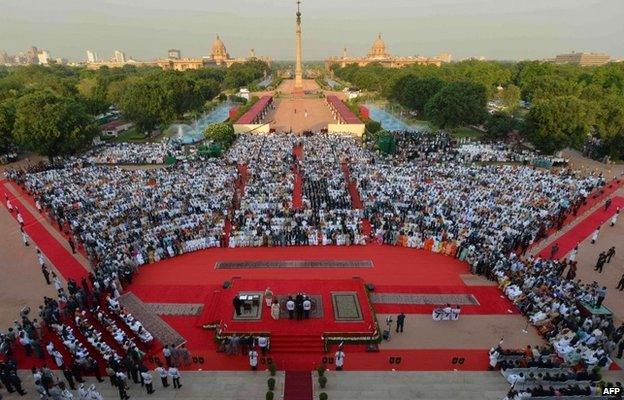
Monday's grand outdoor ceremony was held in the forecourt of the Presidential Palace
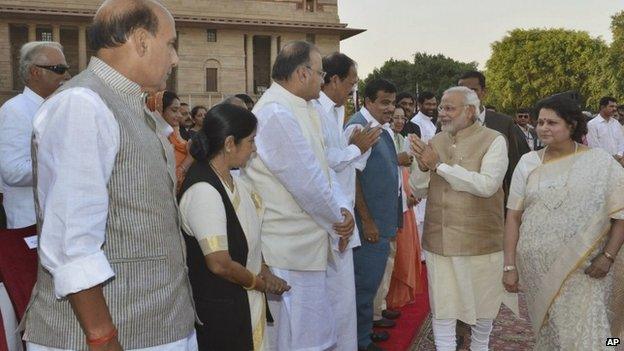
Mr Modi greeted other leaders upon his arrival at the palace
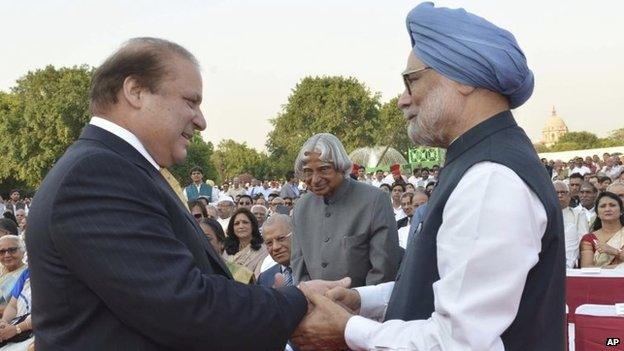
Outgoing PM Manmohan Singh, right, greets Pakistani PM Nawaz Sharif as former Indian president APJ Abdul Kalam watches
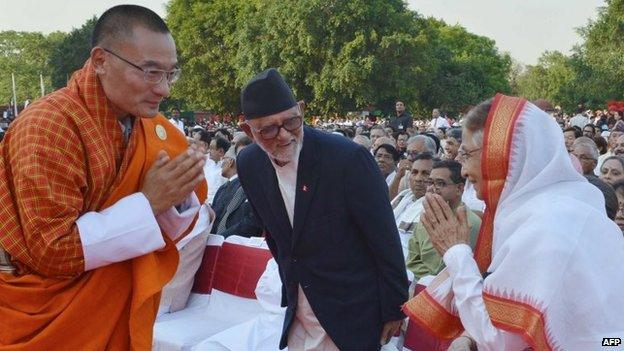
Bhutanese PM Tshering Tobgay (left) greets former Indian president Pratibha Patil as Nepalese PM Sushil Koirala looks on
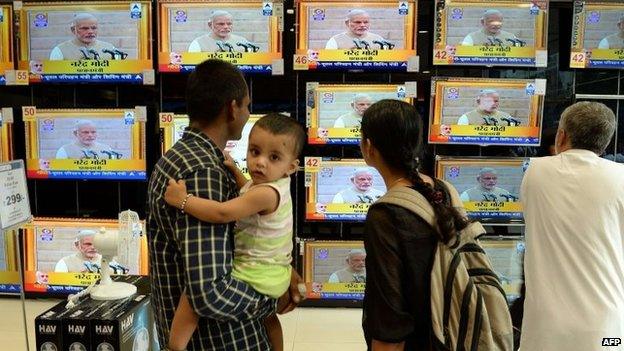
Residents watch Narendra Modi taking the oath at a television showroom in Mumbai
It is a great moment and a great opportunity," Mr Sharif told the NDTV, external network on his arrival in Delhi for the swearing-in ceremony.
"This is a chance to reach out to each other. Both governments have a strong mandate... This could help in turning a new page in our relations."
The Pakistani prime minister said the neighbours should use their cultural and traditional similarities to help improve ties.
"We should remove fears, mistrust and misgivings about each other... Both countries should rid the region of instability and security that has plagued us for decades," he added.
Tight security and traffic restrictions was imposed in Delhi and all offices around the presidential palace were closed five hours before the event, according to the Press Trust of India.
Given the margin of victory, the BJP will be able to govern without coalition partners - 272 MPs are required for an absolute majority.
The Congress party finished with just 44 of the 543 seats and under 20% of the vote in what was its worst-ever performance.

What the papers say
Pakistan Today, external said the Sharif visit conveyed a positive message: "Pakistan and India have a historic opportunity to break the gridlock."
Urdu daily Jinnah, external: "We believe the Delhi meeting won't bring any revolution in ties between the two countries. But it would overcome the prevailing environment of doubts and suspicions.
Karachi-based Islam, external said: "The talks should be held on equal ground and dispute resolution should be given top priority."
The Indian Express, external said the surprise invitation underscored the new political will in Delhi to take risks for peace. "Modi is telling the many Western busybodies... that India can manage the Pakistan problem on its own."
The Times of India, external said: "It's not that the bilateral scheduled between Modi and Sharif is going to settle old problems... It's rather that the two leaders get valuable face time."
